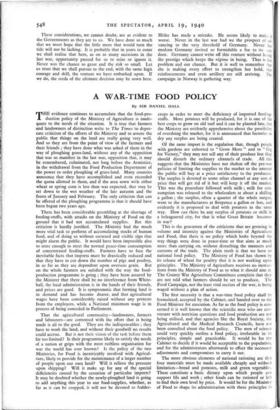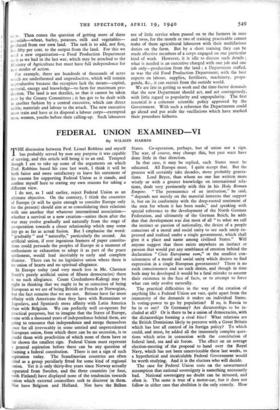A WAR-TIME FOOD POLICY
By SIR DANIEL HALL
THE evidence continues to accumulate that the food-pro- duction policy of the Ministry of Agriculture is inade- quate to the needs of the situation. It is true that farmers and landowners of distinction write to The Times to depre- cate criticism of the efforts of the Ministry, and to assure the public that things on the land are really going very well. And so they are from the point of view of the farmers and their friends ; they have done what was asked of them in the way of ploughing grass-land, without any of the opposition that was so manifest in the last war, opposition that, it may be remembered, culminated, not long before the Armistice, in the withdrawal from the Food Production Department of the power to order ploughing of grass-land. Many counties announce that they have accomplished and even exceeded the quota allotted to them, and if the area sown with either wheat or spring corn is less than was expected, that may be set down to the wet weather of the late autumn and the frosts of January and February. The only criticism that can be offered of the ploughing programme is -that it should have been begun two years ago.
There has been considerable grumbling at the shortage of feeding-stuffs, with attacks on the Ministry of Food on the ground that it had not accumulated supplies. But this criticism is hardly justified. The Ministry had the much more vital task to perform of accumulating stocks of human food, and of doing so without outward and visible sign that might alarm the public. It would have been impossible also to store enough to meet the normal peace-time consumption of concentrated feeding-stuffs. Farmers have to face the inevitable facts that imports must be drastically reduced and that they have to cut down the number of pigs and poultry, in so far as they are dependent upon overseas grain. But on the whole farmers are satisfied with the way the food- production programme is going ; they have been assured by the Minister that there shall be no interference from White- hall, the local administration is in the hands of their friends, and prices are good. It is symptomatic that farming land is in demand and has become dearer, and that agricultural wages have been considerably raised without any protests from the employers, while a National minimum wage is in process of being conceded in Parliament.
That the agricultural community—landowners, farmers and labourers—are contented with the effort that is being made is all to the good. They are the indispensables ; they have to work the land, and without their goodwill no results could accrue. But is not their vision of the task before them far too limited? Is their programme likely to satisfy the needs of a nation at grips with the most ruthless organisation for war the world has ever known? Is the policy of the two Ministries, for Food is inextricably involved with Agricul- ture, likely to provide for the maintenance of a larger number of people upon our own land? Will it relieve the pressure upon shipping? Will it make up for any of the special deficiencies caused by the cessation of particular imports? It may be doubted whether the newly-ploughed land is going to add anything this year to our food-supplies, whether, as far as it can be cropped, it will not be devoted to fodder- crops in order to meet the deficiency of imported feeding- stuffs. More potatoes will be produced, for it is one of the best crops to grow on old turf and it can be planted late, but the Ministry are evidently apprehensive about the possibility of overdoing the market, for it is announced that factories to dry any surplus are being created.
Of the same import is the regulation that, though people with gardens are exhorted to " Grow More " and to " Dig for Victory," they may not sell any of their produce lest they should disturb the ordinary, channels of trade. , All this suggests that the Ministries have not shaken off the pre-war policies of limiting the supplies to the market to the amount the public will buy at a price satisfactory to the producers. The surplus is devoted to some other channel at any sort of price that will get rid of it but will keep it off the market. This was the procedure followed with milk ; milk for con- sumption was released to the wholesalers at about a shilling a gallon ; the surplus, often a quarter of the whole output, went to the manufacturers at fivepence a gallon or less, and evidently it is proposed to deal with potatoes in the same way. How can there be any surplus of potatoes or milk in a beleaguered city, for that is what Great Britain becomes in war?
This is the gravamen of the criticisms that are growing in volume and intensity against the Ministries of Agriculture and Food, that there is no policy which looks beyond the way things were done in peace-time or that aims at much more than carrying on, without disturbing the manners and customs of the trade. The plain truth is that we have no national food policy. The Ministry of Food has shown by its release of wheat for poultry that it is not working upon principles. The Ministry of Agriculture receives no instruc- tions from the Ministry of Food as to what it should aim at. The County War Agriculture Committees complain that they are not told what farmers should be set to produce. The Food Campaign, not the least vital section of the war, is being waged without a plan of action.
The first necessity is that a war-time food policy shall be formulated, accepted by the Cabinet, and handed over to the Food Minister for execution. As far as the food policy is con- cerned it is well known that the scientific men who are con- versant with nutrition questions and food production are not being utilised, and that agencies like the Royal Society, the Agricultural and tie Medical Research Councils, have not been consulted about the food policy. The men of science could very quickly outline a food policy, irrefutable in its principles, simple and practicable. It would be for the Cabinet to decide if it would be acceptable to the population, and for the administrators afterwards to effect the necessary adjustments and compromises to carry it out.
The more obvious elements of national rationing are that four materials must be made available cheaply and without limitation—bread and potatoes, milk and green vegetables. These constitute a basic dietary upon which people can support life and work ; other foods can be rationed or left to find their own level by price. It would be for the Ministry of Food to shape its administration with these principles in vi v. Then comes the question of getting more of these cs,antials—wheat, barley, potatoes, milk and vegetables— pr. duced from our own land. The task is to add, not five, bt-. fifty per cent. to the output from the land. For this we mad a new organisation—a Food Production Department se_h as we had in the last war, which may be attached to the M.nistry of Agriculture but must have full independence for modes of action.
For example, there are hundreds of thousands of acres which are underfarmed and unproductive, which will remain unproductive because the occupiers lack the means—capital, material, energy and knowledge—to farm for maximum pro- duction. The land is not derelict, so that it cannot be taken ar by the County Committees ; it has got to be dealt with in another fashion by a central executive, which can direct tackle, materials and labour to the attack. The new executive must train and have at its disposal a labour corps—exempted men, women, youths before their calling-up. Such labourers are of little service when passed on to the farmers in ones and twos, for the month or two of training practicable cannot make of them agricultural labourers with their multifarious duties on the farm. But by a short training they can be made effective members of a corps engaged on one particular kind of work. However, it is idle to discuss such details ; what is needed is an executive charged with one job and one job only—production from the land ; a Department staffed, as was the old Food Production Department, with the best experts on labour, supplies, fertilisers, machinery, propa- ganda, &c., it can recruit from the outside world.
We are late in getting to work and the time-factor demands that the new Department should act, and act courageously, with little regard to popularity and unpopularity. The first essential is a coherent scientific policy approved by the Government. With such a reference the Departments could go ahead and put aside the vacillations which have marked their procedure hitherto.











































 Previous page
Previous page